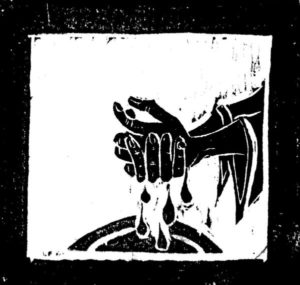“Then they are to speak up and say, ‘This blood was not shed by our hands, nor have we seen who did it. Adonai, forgive your people Israel, whom you redeemed; do not allow innocent blood to be shed among your people Israel.’ And they will be forgiven this bloodshed.”-Deuteronomy 21:7-8
One small bite at a time, we are continuing to get through the details of the mysterious ritual being conducted by the town elders in response to the discovery of an anonymous murder victim’s body.
I ended my last post by affirming that because this ritual is not being done on holy ground, there is no altar, and the animal being killed is not burned up, this is NOT a sacrifice.
Therefore, it must be something else.
With that in mind, let’s move forward.
We’re next told that the elders of the town who have been assigned with bloodguilt wash their hands with water over the body of the Heifer and then recite out loud the following declaration:
“Adonai, forgive your people Israel,
whom you redeemed;
do not allow innocent blood to be shed
among your people Israel.”
-Deuteronomy 21:8
One point I need to clear up right off the bat here is a big mistake most Bible translators make when they say that…
…these words recited aloud by the elders are a “vow” to God.
There are two reasons why that can’t be true.
The first reason is that the Lord’s Holy Name is NOT being used according to the traditional vow or oath-making formula.
It is a NON-NEGOTIABLE REQUIREMENT that the Lord’s Name must be invoked when making a vow or an oath.
One other reason and this involves a technical Hebrew grammar point.
For those who know Hebrew, you’ll know exactly what I’m talking about.
In the very beginning of this declaration in Hebrew, you will NOT find the Hebrew participle IM.
It is this IM participle that determines whether a statement becomes a vow or not.
It imparts the idea of “I swear” in English.
Minus the IM, the sentence becomes much weaker, more along the lines of “I declare”.
Are you getting what I’m saying here?
Let me make it really clear for you so there will be no misunderstanding.
Because verse 8 in Deuteronomy 21 does NOT have the IM giving the idea of “I swear”, we can safely conclude that what the elders pronounced here was absolutely NOT a vow or an oath.
Got it?
Case closed.
Let’s next move on to the matter of hand washing.
First of all, in the ancient Middle East, hand washing was a symbolic indication that one was innocent of a given matter.
That is what the elders were expressing here via their hand washing.
They were making a public statement that they shouldn’t bear bloodguilt because they weren’t involved in the killing, they had no idea who committed the murder and there was no reasonable way they could have prevented or even anticipated this crime happening.
Probably the most famous hand washing incident in all of history was Pontus Pilate washing his hands at the kangaroo trial that had Yeshua sentenced to death.
When Pontus Pilate was washing his hands, he was in effect telling the crowd “I am innocent of this prisoner’s blood”.
In fact, this hand washing custom has made its way into common English usage.
Whenever we say “I’ve washed my hands of the matter”, we are indicating our innocence in a given matter.
Interestingly, some mystical groups within Orthodox Judaism hold to the belief that immediately upon awakening in the morning, one must wash their hands because apparently while sleeping multitudes of demons have attached themselves to one’s hands and they have to be washed off.
Onward.
If as I affirmed in the beginning of this post that what the elders declared here was NOT a vow or an oath, then exactly what kind of statement is this?
Well, think about it for a second.
What would we call a declaration to God that is NOT a vow or an oath?
Would it not be a “prayer”?
Well, by golly, hold the phone, because that’s what I think this declaration we’re dealing with here just might be.
This is a PRAYER!
The elders are making an appeal to the Lord to absolve them and their community of the bloodguilt caused by the murder of an innocent person.
Remember, I’ve already established that this ritual procedure is NOT a sacrifice.
And if it’s not a sacrifice, then technically the Heifer’s death does NOT carry any atoning power with it, does it?
If not, then what exactly is going on here?
The purpose of this whole ritual is to serve as an illustration and demonstration to the people of just how the Lord will respond when they OBEY HIS COMMANDS!
This is actually a prayer for forgiveness.
Actually, let me rephrase that.
This is a prayer for forgiveness ONLY AVAILABLE TO THOSE WHO HAVE ALREADY BEEN REDEEMED!
An unbeliever can’t say a prayer like this.
The only reason the elders were even eligible to say a prayer for forgiveness like this directed to the Creator of the whole universe is because they were seen as already redeemed (or “saved” to use gentile talk).
This prayer was actually the key to being forgiven in this particular situation.
That’s the main takeaway I want you to get from this post.
It is only those who are of “redeemed status” who are even eligible to stand before the Father and ask for mercy and forgiveness.
The unredeemed do NOT have such an option available to them.




Leave a Reply